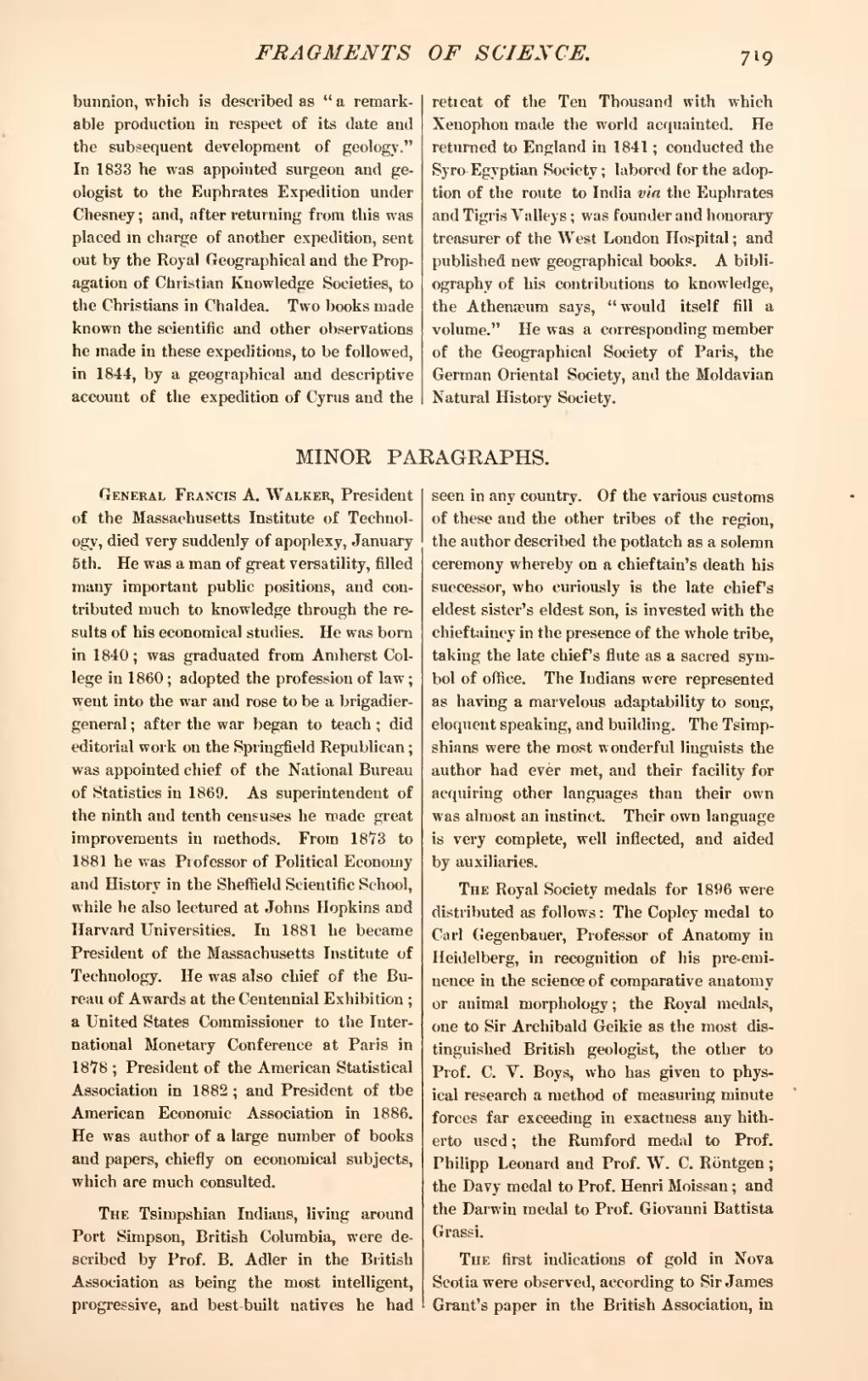bunnion, which is described as "a remarkable production in respect of its date and the subsequent development of geology." In 1833 he was appointed surgeon and geologist to the Euphrates Expedition under Chesney; and, after returning from this was placed in charge of another expedition, sent out by the Royal Geographical and the Propagation of Christian Knowledge Societies, to the Christians in Chaldea. Two books made known the scientific and other observations he made in these expeditions, to be followed, in 1844, by a geographical and descriptive account of the expedition of Cyrus and the retreat of the Ten Thousand with which Xenophon made the world acquainted. He returned to England in 1841; conducted the Syro-Egyptian Society; labored for the adoption of the route to India via the Euphrates and Tigris Valleys; was founder and honorary treasurer of the West London Hospital; and published new geographical books. A bibliography of his contributions to knowledge, the Athenæum says, "would itself fill a volume." He was a corresponding member of the Geographical Society of Paris, the German Oriental Society, and the Moldavian Natural History Society.
General Francis A. Walker, President of the Massachusetts Institute of Technology, died very suddenly of apoplexy, January 5th. He was a man of great versatility, filled many important public positions, and contributed much to knowledge through the results of his economical studies. He was born in 1840; was graduated from Amherst College in 1860; adopted the profession of law; went into the war and rose to be a brigadier-general; after the war began to teach; did editorial work on the Springfield Republican; was appointed chief of the National Bureau of Statistics in 1869. As superintendent of the ninth and tenth censuses he made great improvements in methods. From 1873 to 1881 he was Professor of Political Economy and History in the Sheffield Scientific School, while he also lectured at Johns Hopkins and Harvard Universities. In 1881 he became President of the Massachusetts Institute of Technology. He was also chief of the Bureau of Awards at the Centennial Exhibition; a United States Commissioner to the International Monetary Conference at Paris in 1878; President of the American Statistical Association in 1882; and President of the American Economic Association in 1886. He was author of a large number of books and papers, chiefly on economical subjects, which are much consulted.
The Tsimpshian Indians, living around Port Simpson, British Columbia, were described by Prof. B. Adler in the British Association as being the most intelligent, progressive, and best-built natives he had seen in any country. Of the various customs of these and the other tribes of the region, the author described the potlatch as a solemn ceremony whereby on a chieftain's death his successor, who curiously is the late chief's eldest sister's eldest son, is invested with the chieftaincy in the presence of the whole tribe, taking the late chief's flute as a sacred symbol of office. The Indians were represented as having a marvelous adaptability to song, eloquent speaking, and building. The Tsimpshians were the most wonderful linguists the author had ever met, and their facility for acquiring other languages than their own was almost an instinct. Their own language is very complete, well inflected, and aided by auxiliaries.
The Royal Society medals for 1896 were distributed as follows: The Copley medal to Carl Gegenbauer, Professor of Anatomy in Heidelberg, in recognition of his pre-eminence in the science of comparative anatomy or animal morphology; the Royal medals, one to Sir Archibald Geikie as the most distinguished British geologist, the other to Prof. C. V. Boys, who has given to physical research a method of measuring minute forces far exceeding in exactness any hitherto used; the Rumford medal to Prof. Philipp Leonard and Prof. W. C. Röntgen; the Davy medal to Prof. Henri Moissan; and the Darwin medal to Prof. Giovanni Battista Grassi.
The first indications of gold in Nova Scotia were observed, according to Sir James Grant's paper in the British Association, in

